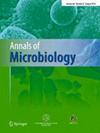耐热PGPR联合体B3P调节玉米营养生长早期耐热性的生理生化和分子机制
IF 3
4区 生物学
Q2 BIOTECHNOLOGY & APPLIED MICROBIOLOGY
引用次数: 1
摘要
全球变暖和温度的不规则变化是植物生长的严重威胁,对产量有显著的负面影响。由于气温的突然波动和热浪,全球玉米产量大幅下降,特别是在受气候变化影响严重的地区。结果本研究证实了有益菌在玉米生长早期诱导耐热性的潜力。三芽孢杆菌。AH-08 AH-67 SH-16和一种假单胞菌。SH-29在45±2°C的高温下表现出生长能力和多种植物有益性状。在45°C和50°C温度下,芽孢杆菌SH-16上调15和30 kDa的小热休克蛋白(HSP), SH-16和AH-67上调65和100 kDa的大热休克蛋白。采用B3P(3芽孢杆菌+ 1假单胞菌)联合体对6个杂交玉米品种在25±2℃条件下进行接种。对10日龄的幼苗进行热休克处理:38℃下3 h, 48 h恢复期,然后42℃下48 h。B3P处理显著改善了植株的整体生长(株高、根系和幼苗生长);拍摄新鲜的& &;干重、根和叶面积),CAT、POD、总叶绿素和类胡萝卜素水平较高,而MDA浓度较低。应激条件下,bp - p处理后细胞总蛋白和氨基酸含量无显著差异。HSP1和HSP18在Malka和YH-5427中的表达高于未接种处理,HSP70和HSP101在FH-1046和Gohar中的表达高于未接种处理。结论耐热促生根瘤菌(Ht-PGPR)在不同玉米品种幼苗/营养生长早期对植物的生长和耐热性具有多效性、多相性和差异性响应。后续的研究将集中在这些PGPR的田间评价上,以观察该联合体在田间自然温度波动下的田间和产量响应。本文章由计算机程序翻译,如有差异,请以英文原文为准。
Thermotolerant PGPR consortium B3P modulates physio-biochemical and molecular machinery for enhanced heat tolerance in maize during early vegetative growth
Abstract Background Global warming and irregular changes in temperature are a serious threat to plant growth with a significant negative impact on yield. Global maize productivity has decreased significantly due to sudden temperature fluctuations and heat waves especially in the regions severely hit by climate change. Results The current study demonstrates the potential of beneficial bacteria for inducing heat tolerance in maize during early growth. Three Bacillus spp . AH-08, AH-67, SH-16, and one Pseudomonas spp . SH-29 showed the ability to grow and exhibited multiple plant-beneficial traits up to 45 ± 2 °C. At temperatures of 45 and 50 °C, Bacillus sp. SH-16 exhibited upregulation of two small heat shock proteins (HSP) of 15 and 30 kDa, while SH-16 and AH-67 showed upregulation of two large HSP of 65 and 100 kDa. Plant-inoculation with the consortium B3P (3 Bacillus + 1 Pseudomonas spp.) was carried out on six hybrid maize varieties pre-grown at 25 ± 2 ºC. Heat shock was applied to 10-day-old seedlings as: 3 h at 38ºC, 48 h recovery period, and then 48 h at 42ºC. The B3P treatment showed significant improvement in the overall plant growth (plant height, root & shoot fresh & dry weight, root and leaf area) with a higher level of CAT, POD, total chlorophyll, and carotenoids, while low concentration of MDA. A non-significant difference was observed in case of total cell protein and amino acids after B3P-treatment under stress. The expression of HSP1 and HSP18 in Malka and YH-5427 while HSP70 and HSP101 were higher in FH-1046 and Gohar as compared to non-inoculated treatment. Conclusions These findings indicate that heat-tolerant plant-growth promoting rhizobacteria (Ht-PGPR) exert versatile, multiphasic and differential response to improve plant growth and heat-tolerance in different maize varieties during seedling/ early vegetative growth. Subsequent research will be focused on the field evaluation of these PGPR to see the field and yield response of this consortium under natural temperature fluctuations in field.
求助全文
通过发布文献求助,成功后即可免费获取论文全文。
去求助
来源期刊

Annals of Microbiology
生物-生物工程与应用微生物
CiteScore
6.40
自引率
0.00%
发文量
41
审稿时长
3.2 months
期刊介绍:
Annals of Microbiology covers these fields of fundamental and applied microbiology:
general, environmental, food, agricultural, industrial, ecology, soil, water, air and biodeterioration.
The journal’s scope does not include medical microbiology or phytopathological microbiology.
Papers reporting work on bacteria, fungi, microalgae, and bacteriophages are welcome.
Annals of Microbiology publishes Review Articles, Original Articles, Short Communications, and Editorials.
Originally founded as Annali Di Microbiologia Ed Enzimologia in 1940, Annals of Microbiology is an official journal of the University of Milan.
 求助内容:
求助内容: 应助结果提醒方式:
应助结果提醒方式:


